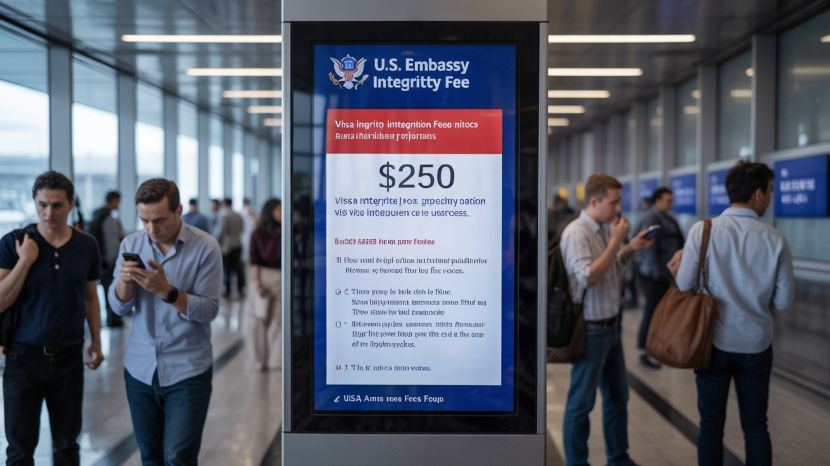Canada Now Joins India, China, Brazil, Mexico, Egypt And More in U.S. Visa Integrity Fee Warning Effective From October 1, 2025 What Travelers Need to Know
Canadians may face higher costs with the new U.S. Visa Integrity Fee. Here's what you need to know about the changes, including impact on families and business travel.
(This Image is AI Generated)
As of October 1, 2025, Canada has joined countries like India, China, Brazil, Mexico, and Egypt in facing new changes to U.S. visa costs due to the introduction of the Visa Integrity Fee. This additional $250 charge will be levied on certain non-immigrant visa applicants, including those traveling for work, family visits, or special purposes. While Canadian citizens traveling for short trips to the U.S. are not affected, Canadian permanent residents and other visa applicants will be required to pay this additional fee, which could substantially raise the overall cost of obtaining a U.S. visa.
The new fee is part of the U.S. government’s ongoing efforts to improve visa enforcement and prevent overstays, but it also adds significant financial burden, particularly for families and students already facing high visa application costs. The fee is set to increase annually, and travelers are being urged to stay informed about the latest guidelines from the U.S. Department of State and their respective embassies.
This change is making waves not only in Canada, but also across many other countries like Brazil, China, Mexico, and Egypt, impacting a wide range of travelers. For those looking to visit the United States, whether for business, education, or family matters, it’s important to understand how the new fees will affect their plans, and what steps need to be taken to manage the increased costs.
The Impact of the Visa Integrity Fee on Canadian Travelers
The newly introduced Visa Integrity Fee is part of a broader policy under President Donald Trump’s One Big Beautiful Bill Act, which aims to address U.S. immigration concerns and strengthen oversight of non-immigrant visa holders. While most Canadian citizens who are traveling for short trips to the U.S. will not be affected, individuals requiring work visas, family reunification, or special visas could face significant costs.
Global Affairs Canada, the government body that manages Canadian diplomatic relations, has issued a statement acknowledging the change and advising Canadians to review U.S. visa requirements carefully. Travelers from Canada should also keep an eye on any updates issued by the U.S. Department of State and their local U.S. consulate.
Why This Fee Matters
The Visa Integrity Fee was introduced to discourage visa overstays and encourage compliance with U.S. travel regulations. Travelers who adhere to these regulations may be eligible for a refund of the fee. However, the new fee significantly raises the cost of obtaining a U.S. visa, especially for families, students, and workers who already face substantial application costs. This could result in fewer people applying for U.S. visas, particularly those with tight travel budgets.
Additionally, the fee is set to increase each year beginning in 2026, with adjustments linked to inflation. For many families, the higher costs could lead them to reconsider or delay their travel plans.
What Canadians Should Know About Travel Procedures
According to Thida Ith, a spokesperson for Global Affairs Canada, Canadian citizens are generally exempt from needing a visitor, business, or transit visa for short visits to the United States. However, those who are Canadian permanent residents or need certain work or family visas must pay the new fee, in addition to the existing application fees.
Canadians are urged to consult official government sources for specific visa details. Global Affairs Canada has also pointed out that visa fees can change at any time, and thus they do not always update their Travel Advisory pages immediately with visa fee changes. Therefore, it is crucial for travelers to stay informed and check for updates on the U.S. Department of State website or local U.S. consulates.
U.S. Border Procedures and Documentation Requirements
In addition to the higher costs, Canadians traveling to the U.S. will need to be prepared for potentially stricter border procedures. Border agents may request more documentation to confirm the purpose of the trip, and there may be increased scrutiny at entry points. Canadians should expect the possibility of having their electronic devices inspected, and they might be asked to demonstrate strong ties to Canada—proof that they intend to return after their stay in the U.S. Failure to do so could result in detention or denial of entry.
Travelers should also note that any visit exceeding 30 days will need to be registered with U.S. authorities. Biometric checks and other increased security screenings are becoming more common at U.S. airports, and Canada’s official Travel Advisory for the U.S. highlights that travelers can expect these additional checks at most ports of entry.
The Future of U.S. Travel and Its Economic Impact
The new Visa Integrity Fee may also have unintended consequences for U.S. tourism. As Xiao Wang, CEO of Boundless Immigration, points out, although governments often view tourism and temporary migration as a boost to their economies, the additional visa costs could deter travelers from visiting. This could lead to a reduction in overall spending by foreign tourists, ultimately lowering tax revenues rather than strengthening the U.S. border security system as intended.
U.S. officials have stated that the fee is designed to improve visa integrity, but it remains to be seen how much the economic impact will be, especially as travelers from countries that are not part of the Visa Waiver Program will now be required to pay $435 for a visa—double the original fee.
Countries Affected by the U.S. Visa Integrity Fee:
- India: The Indian government has expressed concerns about the new fee, highlighting its potential impact on travelers and students applying for U.S. visas.
- China: Chinese officials have raised issues regarding the additional financial burden the fee imposes on travelers seeking U.S. visas.
- Brazil: Brazilian authorities have acknowledged the fee’s effect on their citizens applying for U.S. visas, urging travelers to prepare for the increased costs.
- Mexico: Mexican officials have noted the fee’s impact on travelers from Mexico, advising them to account for the additional expense in their travel plans.
- Argentina: Argentine authorities have indicated that their citizens will be subject to the new fee when applying for U.S. visas.
- Nigeria: Nigerian nationals applying for U.S. visas are also affected by the new fee, as they are not part of the Visa Waiver Program.
- Pakistan: Pakistani travelers seeking U.S. visas will need to pay the additional $250 fee, as their country is not included in the Visa Waiver Program.
- South Africa: South African nationals applying for U.S. visas are subject to the new fee, which adds to the overall cost of obtaining a visa.
- Philippines: Filipino travelers seeking U.S. visas will be required to pay the additional $250 fee, as the Philippines is not part of the Visa Waiver Program.
- Egypt: Egyptian nationals applying for U.S. visas are affected by the new fee, which increases the total cost of obtaining a visa.
Travelers from these countries are advised to consult official government sources, such as the U.S. Department of State, for the most current information on visa application procedures and fees. It’s important to stay informed about any updates or changes to the visa process that may affect travel plans.
Quick Tips for Canadian Travelers
- Check Visa Requirements: If you’re a Canadian permanent resident or applying for a specific type of visa, review the updated U.S. visa requirements and be prepared for the additional fees.
- Budget for Extra Costs: The total cost of a U.S. visa could increase significantly, particularly for families. Ensure you budget not only for the application fee but also for any additional costs related to flights and accommodation.
- Stay Updated: Keep checking the U.S. Department of State’s website and the nearest U.S. consulate for any changes to visa application procedures and fees.
- Understand Border Procedures: Prepare for increased documentation requirements at U.S. ports of entry, and be ready for the possibility of device checks and other security measures.
- Plan Ahead for Delays: Increased security checks and visa scrutiny may lead to longer waiting times at U.S. immigration and customs.
Key Points to Keep in Mind
- New U.S. Visa Integrity Fee: An additional $250 is required for certain non-immigrant visas, effective October 1, 2025.
- Visa costs for families could exceed CA$2,400 for a family of four.
- Stricter U.S. entry procedures: Expect increased checks and potential device inspections.
- Canadians traveling to the U.S. should stay updated on the latest visa requirements via the U.S. Department of State website.
- The Visa Integrity Fee is expected to rise annually, starting in 2026, with adjustments for inflation.
Conclusion:
With the introduction of the Visa Integrity Fee, Canada and several other countries, including India, China, Brazil, Mexico, and Egypt, are now facing higher visa costs. This added fee, intended to discourage visa overstays and improve enforcement, has significant implications for travelers, especially families, students, and business professionals. As the fee is set to rise annually, it’s essential for travelers to stay informed and plan accordingly. Always check with the U.S. Department of State or your local embassy for the latest updates on visa requirements and associated costs to ensure smooth travel planning.
The post Canada Now Joins India, China, Brazil, Mexico, Egypt And More in U.S. Visa Integrity Fee Warning Effective From October 1, 2025 What Travelers Need to Know appeared first on Travel and Tour World


Comments and Responses
Please login. Only community members can comment.